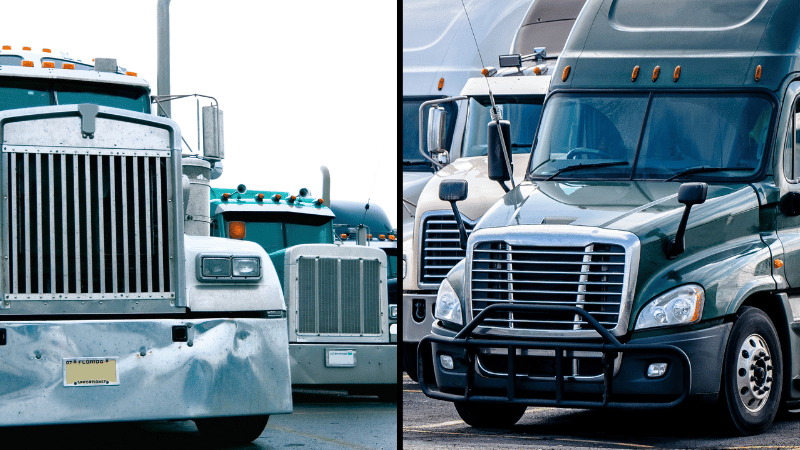by Dennis McGeary
As a seasoned commercial truck driver, my journey with both new and used trucks has shown me the complexities of this crucial decision. At Keep Rollin’ On, we recognize the importance of selecting the right truck, a choice deeply connected to your financial stability, business goals, and comfort.
Truck driving is more than a career; it’s a cornerstone of the economy, vital in keeping America’s wheels turning. This makes your truck choice not just a personal decision but a critical economic one. With experiences that have taught me the pros and cons of different truck types, I understand there’s no one-size-fits-all answer.
Let’s embark on this journey together, examining the key factors that should influence your decision and providing insights to help you find the truck that aligns with your unique needs and aspirations.
Understanding Truck Costs
The first step in choosing the right truck is understanding the costs involved. Prices can vary greatly depending on the make, model, features, and market conditions. To give you a practical perspective, let’s compare three Kenworth truck models: the brand new 2023 T680, a 2015 W900L, and a pre-ELD 1999 T2000. Here’s a breakdown of what these trucks might cost. These prices were obtained from advertised listings for each truck.
• 2023 T680: $175,000-$225,000
• 2015 W900L: $40,000-$100,000+
• 1999 T2000: $10,000-$25,000
Remember, having capital for a down payment and reserves is essential. Without it, you may face financial hardships as bills, maintenance, and repair costs pile up.
Comparing Three Truck Models
Each truck model has its unique history and set of considerations. For a fair comparison, we’ll assume you have $30,000 in cash and use a 4-year loan with 10% down and 7% interest. Here’s a breakdown of the costs for each model:
A Look at Additional Costs
Let’s look at some number analysis and see how much that truck will cost. Remember that your credit also factors in, and these are not the complete costs but a good estimate.
| Trucks | 2023 T680 | 2015 W900L | 1999 T2000 |
| Price | $209,000 | $85,000 | $15,000 |
| Federal Tax 12% | $25,000 | $0 | $0 |
| Down Payment | $24,000 | $8,500 | $0 |
| Total Loan Amount | $210,600 | $76,500 | $0 |
| Total Loan Interest at 7% | $31,468 | $11,431 | $0 |
| Monthly Payments | $5,043 | $1,832 | $0 |
| Or Weekly Payments | $1,162 | $423 | $0 |
| Total Purchase Cost | $265,468 | $96,431 | $15,000 |
At first glance, the 1999 T2000 seems like the best deal, saving you significantly in annual truck payments. However, it’s essential to consider factors like fuel efficiency and potential repair costs. It’s crucial to find a truck with a well-documented history of maintenance, as this can greatly give you a better idea of its possible longevity and performance.
Fuel Efficiency:
Critical Factors for Your Truck Choice
Understanding fuel efficiency is vital when considering the cost implications of your truck. For instance, the 2023 Kenworth T680 boasts up to 8 mpg, the 2015 W900L around 7 mpg, and the older 1999 T2000 approximately 6 mpg. While these differences may appear small, they can have a substantial impact on your annual expenses, especially given the variability in fuel costs.
The advertised fuel economy for these trucks serves as a general guide, but remember, your truck’s actual miles per gallon can vary based on several factors. Regular driving habits, the specific make and model of the truck, and fluctuating fuel prices all play a role in determining your real-world fuel costs. It’s important to consider these nuances as they can lead to significant variations in your yearly fuel expenditure.
If you drive an average of 48 weeks per year at 3,000 miles per week and you don’t idle your truck—how much will it cost per week to keep moving down the highway? We all know that fuel prices fluctuate. For our comparison, let’s say fuel is at an average of $4.549 per gallon.
| Trucks | 2023 T680 | 2015 W900L | 1999 T2000 |
| Gallons per Week | 375GL | 428GL | 500GL |
| Weekly Cost | $1,706 | $1,957 | $2,275 |
| Gallons per Year | 18,000GL | 20,544GL | 24,000GL |
| Yearly Cost | $81,888 | $93,936 | $109,200 |
This variance in fuel efficiency can lead to substantial savings or expenses, depending on your choice of truck. Keep in mind that fluctuations in fuel prices will impact these calculations.
The Reality of Repairs and Maintenance
Repairs and maintenance are where the real challenges lie. New trucks come ready-to-go but aren’t immune to breakdowns. Having dealt with both new and old trucks, I’ve learned that while older trucks offer more flexibility in choosing a repair shop, new trucks may bind you to specific dealerships, which can be costly and time-consuming.
All trucks, whether new or used, will inevitably require repairs, which can be costly both financially and in terms of time. New trucks like the 2023 T680 generally come with fewer immediate repair needs, but they are not immune to breakdowns. Unexpected visits to the repair shop are common, and dealing with dealerships for service can lead to long wait times and high labor costs.
Used trucks offer more flexibility in terms of repair locations. However, they might require more frequent maintenance, especially as they age. The cost of repairs, along with the potential downtime, can add up quickly. For instance, DEF filters in newer models require cleaning every 100,000 to 200,000 miles, costing around $2,500 annually, a cost not applicable to older models like the 1999 T2000. One important factor to consider when evaluating a used truck is your ability to perform some of the repairs yourself. Being able to do some of the work yourself will save you money, making repairs less costly.
Personal Experiences with Truck Repairs
As a veteran truck driver, I’ve experienced a range of issues with both new and used trucks. My newer VNL760 required multiple repairs, leading to significant downtime and loss of work. As the truck aged, more repairs fell outside the warranty coverage, leading to additional expenses. In contrast, my older trucks allowed for more repair flexibility, I was able to find more shops that could work on them, though they experienced more breakdowns than the newer trucks.
One recent incident highlights the advantage of using independent repair shops for used trucks. When faced with an oil leak, I chose to avoid the high diagnostic costs of a dealership, instead opting for my trusted local shop, resulting in cost savings nearing $1,500.
Analyzing Additional Costs: A Comprehensive Look
Understanding the Full Picture of Truck Ownership Costs
When considering the purchase of a truck, it’s vital to look beyond the sticker price. Several additional costs contribute to the total expenditure of owning a truck. This analysis provides a breakdown of these costs for three truck models: the new 2023 Kenworth T680, the 2015 Kenworth W900L, and the older 1999 Kenworth T2000. Remember, these figures are estimates and may vary based on your specific circumstances.
Cost Breakdown for Different Truck Models
Let’s compare the yearly costs for these models, considering various expenses such as insurance, trailer rent, fuel, maintenance, tires, permits, and truck payments:
| Truck | 2023 T680 | 2015 W900L | 1999 T2000 |
| Insurance | $13,000 | $10,000 | $8,000 |
| Trailer Rent | $18,000 | $18,000 | $18,000 |
| Fuel Cost | $81,000 | $93,455 | $109,177 |
| Preventative Maintenance | $2,000 | $2,000 | $2,000 |
| Tires | $3,400 | $3,400 | $3,400 |
| Permits | $300 | $300 | $300 |
| Truck Payments | $60,540 | $21,984 | $0 |
| Total Yearly Costs | $179,122 | $149,139 | $140,877 |
| Cost per Mile | $1.24 | $1.04 | $0.98 |
It’s important to note that tire costs are included for all truck models, as they are a necessary reserve for replacements. Truck repairs, a variable yet significant cost, are not included in this estimate but can significantly impact overall expenses.
Adjusting for Repairs: A Realistic Approach
When it comes to truck repairs, it’s crucial to assess the maintenance history of your vehicle. Why haven’t I included specific repair costs in the overall cost comparison? Simply put, repair costs can vary dramatically, and it’s not my intention to skew the analysis towards one truck over another.
Consider the following factors regarding repair costs. For a new truck, most repairs are likely covered under warranty, but the real question is the downtime involved. Imagine a scenario where a used truck requires a $3,000 repair. With an older truck, a small shop might fix it within a day, but for a new truck, the same repair could mean a two-week wait at a dealership. So, while the repair itself might be free for the new truck, the loss of income during the downtime could be significant.
In reality, older trucks often incur higher repair costs, and it’s important to be financially prepared for this. However, owning a new truck isn’t free from challenges either. The need to have repairs done exclusively at dealerships can lead to longer downtimes, impacting your earning potential. Also, consider the potentially higher cost of repairs not covered by warranty, a key aspect in your decision-making process.
Choosing the Right Truck:
Weighing Your Options
Your decision will depend on your financial situation, business goals, and preferences. Here’s a brief summary of what each option entails:
• New Truck: Ready-to-go, fewer initial repairs, covered by warranty, but limited to dealership service and higher initial costs.
• Used Truck: Potentially more maintenance surprises, but offers more service flexibility, depending on the truck, and can be a cost-effective start.
• Older Pre-ELD Model: Lower upfront costs, but potentially higher fuel and repair costs. Offers customization and repair flexibility.
Planning for the Future
As an owner-operator, anticipate repair shop visits and plan financially for them. Each truck choice has its pros and cons, and your decision should be based on a thorough evaluation of these factors.
Conclusion: Your Road to Success
Choosing the right truck is a crucial step in your journey as a truck driver. Take your time, seek advice, and make a decision that aligns with your needs and goals. Remember, after purchasing your truck, we at Keep Rollin’ On are here to support your bookkeeping needs every step of the way. Your success drives the economy, and we’re committed to helping you stay on track.
Article written by Dennis McGeary
Dennis has been a truck driver for over 25 years and has owned and leased both new and used trucks—one truck at a time. Dennis and his fiancé Patrina founded “Keep Rollin’ On”, a bookkeeping service exclusively for the hard-working truck driver like you.


